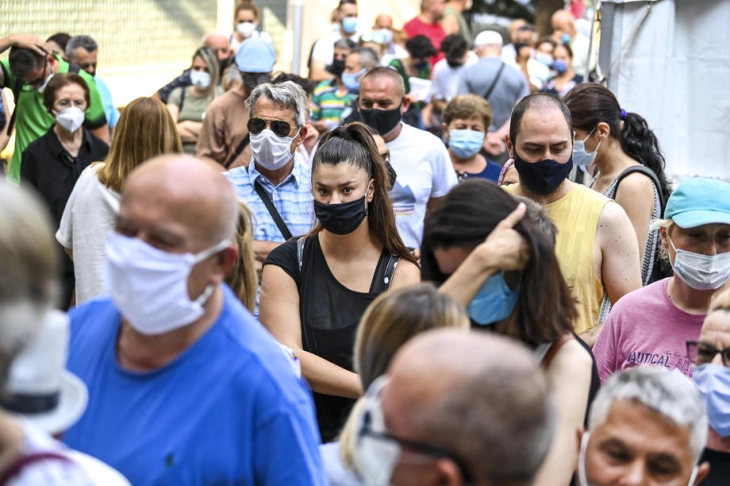Balkans still far from herd immunity for Covid-19
- Post By Magdalena Reed
- 15:54, 6 August, 2021

Sofia, 6 August 2021 (BTA/MIA) — Most Balkan countries continued to report a deterioration of the epidemiological situation over the past week. Some introduced new restrictions in an attempt to stop the quick spread of the coronavirus while others looked for ways to boost the vaccination process, such as requiring unvaccinated persons to show PCR test results to access some public services. At this point, most countries are still not mandating vaccination for certain categories or professions.
GREECE: Restrictive measures including an overnight curfew and a complete ban on music in hospitality establishments will be in force until Aug. 13 on Zakynthos island and in Chania, Crete.
Health Ministry General Secretary Marios Themistocleous said nearly 5.2 million Greeks, or 48 percent of the country's population and 58 percent of the adults, are fully vaccinated. He added vaccination has slowed down because it is the holiday season, but that 40,000 doses a day are being applied nevertheless.
TURKEY: Health Minister Fahrettin Koca said the authorities are considering requiring PCR tests for the unvaccinated to enter in public places like cinemas and theaters or to travel by intercity bus and by airplane. Those who refuse vaccination may be required to take free PCR tests at state hospitals once every two days.
Turkey has seen a spike in coronavirus cases, with 24,297 new cases in the past week and 108 fatalities registered over the last 24 hours on Friday.
So far, Turkey has administered over 74 million doses since its vaccination campaign began in mid-January. A total of 66.77 percent of the population has received at least one dose. At least 7 million doses of vaccine have been administered weekly.
ROMANIA: The state of alert declared for the entire territory of the country has been prolonged for 30 days. New infections have increased as compared to previous weeks, with a prevalence of the delta variant. Nearly 90 percent of the tests taken last week proved delta positive, said vaccination campaign coordinator Dr. Valeriu Gheorghita.
On July 30, Romania reached the threshold of 5 million vaccinated with at least one dose, a goal the authorities had set as June 1. The herd immunity achieved so far as a result of combined vaccination and passed infection is some 45-50 percent, which is insufficient to protect the population, but at this point the authorities are not considering mandatory vaccination for certain categories.
At the same time, Romania continues to donate and resell surplus vaccine doses, announcing this week it would sell 700,000 doses to Ireland and donate nearly 1.3 million doses to Tunisia, Egypt, Albania and Vietnam.
SERBIA: Serbian Prime Minister Ana Brnabic on Thursday said the country has vaccinated 50.1 percent of its adult population, but that is not sufficient to achieve herd immunity. The percentage of vaccinated is over 50 in 58 Serbian cities, she added.
At this point Serbia does not plan on buying more vaccines. Brnabic also said the country would donate vaccines to particularly vulnerable countries, more specifically to friendly countries in Africa.
NORTH MACEDONIA: Thirty-one percent of Macedonians have been vaccinated, the Ministry of Health said. The percentage with people over 50 stands at 50.6, with those over 60 – at 61.2, and at over 70 – at 64.9.
SLOVENIA: Although there are no radical changes in the figures of new cases in recent days, epidemiologists say the situation in the country is deteriorating. If the present trends continue and the level of vaccination of 38.9 percent does not rise considerably – the country, which is currently in the EU green zone, may pass into the amber zone next week and then into the red zone in the beginning of September, health experts warn.
CROATIA: A total of 3,109,586 vaccine doses have been administered in the country so far, with 40.8 percent of the entire population and 49.1 percent of the adult population having received at least one dose.
A total of 1,656,936 people have received at least one dose and 1,506,706, or 44.7 percent of the adult population, are fully vaccinated.
CYPRUS: The millionth dose of anti-Covid-19 vaccine was administered last week. The country with a population of some 1.2 million has one of the highest degrees of vaccination coverage in Europe with 74 percent of the population having received at least one dose and 66 percent fully vaccinated.
At the same time, the number of new cases remains high – 575 new cases and one mortality were confirmed on Aug. 4.
On Thursday, the country introduced the so-called Safepass for all types of public transport. The document certifies that the bearer has received at least one vaccine dose, has had the infection or has had a negative Covid-19 test result within the previous 72 hours. This is required of all passengers, including children over 12.
ALBANIA: The authorities reported an alarming spike in new infections after 99 new cases of Covid-19 were confirmed in the country on Aug. 4.
Health Minister Ogerta Manastirliu recommended that all citizens avail themselves of the free-of-charge vaccination. To date, a total of 1,203,087 doses have been administered in the country, including over 530,000 second doses.







